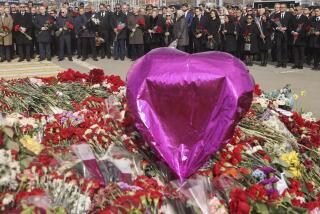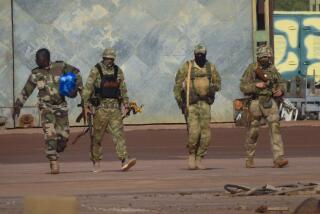Apartment Bombers Trained by Chechens, Russians Say
- Share via
MOSCOW — A year after a series of four bombs decimated apartment buildings and killed more than 300 people in Moscow and southern Russia, security officials said Thursday that the attacks were organized by fighters from Chechnya but carried out by members of other ethnic groups.
The Federal Security Service, or FSB, the main successor to the Soviet KGB, had previously blamed “Chechen terrorists” for the bombings, which set off a wave of panic that was a major impetus for Russia’s current war on the separatist republic.
But in a news conference closed to foreign journalists, FSB officials said the bombers, while acting on orders from Chechen rebels, were ethnic Karachais and Avars.
The FSB has evidence that the terrorism was carried out by “a criminal gang of extremist Wahhabi Muslims trained in camps run by Chechen fighters,” Vladimir Kozlov, deputy head of the agency’s terrorism department, said in excerpts broadcast on the national ORT television network.
The main culprits remain at large, Kozlov said.
Karachais and Avars are two of dozens of ethnic groups in Russia’s volatile Caucasus region. The former are from Karachayevo-Cherkessia and the latter from Dagestan, which borders Chechnya. All three republics are mostly Muslim.
In a three-page press release, the FSB provided new details about how it believes the bomb attacks took place. But as in the past, the evidence presented to demonstrate a link to Chechen rebels was circumstantial: The methods used in the bombings matched plans found inside Chechnya at what the FSB described as a training camp run by a rebel known as Khattab, who goes by only one name.
“We have reliable information showing that these crimes were connected and that they were organized and financed by field commanders of the illegal Chechen military formations,” the press release states.
Suspicions have surrounded the four bombings from the start since officials were quick to blame Chechens and slow to produce evidence supporting the link.
The Interfax news agency quoted another FSB official, Maj. Gen. Alexander Shagako, as saying that 33 people are in custody in connection with the attacks and that 10 others are being sought. Six other suspects wanted in connection with the case are believed to have died in Chechnya during the fighting, Interfax said.
More to Read
Sign up for Essential California
The most important California stories and recommendations in your inbox every morning.
You may occasionally receive promotional content from the Los Angeles Times.













